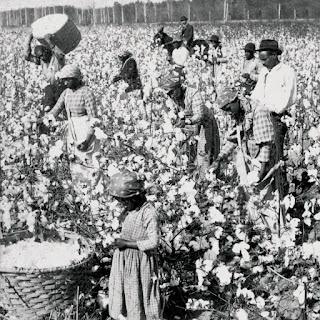
Is the postmodern Republican Party serious about governing? That Donald Trump is the GOP's runaway front-runner for president in 2024 would give some people pause. With no shortage of issues that merit serious attention -- climate change, bank failures, corporate malfeasance, income inequality, racial injustice, dubious policing, and much more -- a segment of Republicans has chosen to rally around the notion that slavery was not all that bad for African Americans.
Florida Governor and presidential candidate Ron DeSantis is a leading voice in a push to alter the teaching of African-American history in a way that some argue is "pro-slavery." Even Chris Christie, the former GOP governor of New Jersey and onetime head of Trump's transition team, has fired back at DeSantis on the slavery issue, and Vice President Kamala Harris has called the new Black history standards "propaganda." Maybe all of this explains why DeSantis is trailing by wide margins in polling for the 2024 GOP primary.
A reasonable person might ask, "How did this become an issue in 2023? Has it not been clear for several hundred years that slavery was an inhumane and evil institution?" Longtime Alabama attorney and civil-rights advocate Donald Watkins seeks to unmuddy the waters with a piece at his Web site under the title "American Slavery is Defined in Slave Codes Adopted by Colonies and States." Writes Watkins:
Today’s Republican politicians want to re-image the history of slavery in America to make it a benign chapter in our history as a nation.
Led by Florida governor Ron DeSantis, many Republican-controlled state legislatures, governors, and state boards of education are now proclaiming that slavery, which was legal in America from 1612 to 1865, was beneficial for the enslaved people of African descent.
A review of my old Property and Constitutional Law books as a student at the University of Alabama’s law school (1970 to 1973) provides a different, accurate, and documented legal history and description of American slavery.
What is the reality of American slavery? Watkins paints the picture, and as many of us already knew, it isn't pretty:
Here are the unvarnished legal tenants of America’s enslavement of Africans, as presented in my law books:
1. Slaves were brought to America packed in the hell holes of slave ships. Those who survived the voyage were forced into the most brutal living and working conditions imaginable.
2. Slaves were deemed to be “chattel property,” not human beings.
3. Slaves were bought, sold, traded, willed to relatives and third parties, mortgaged, and insured, all for the benefit of their owners.
4. Slaves had no rights that white men were bound to respect. Dred Scott v. Sandford (U.S. Supreme Court, 1857).
5. Slaves worked six days per week from sun up to sun down, with bullwhips used to enforce the work ethic imposed by their owners.
Watkins' legal texts make it clear that the horrors of slavery were codified in many American states, both in the North and the South:
6. Slave women were raped by the masters, with impunity. A child born from the rape of an enslaved woman by her master, or an overseer, was a slave for life.
7. All slaves were subject to slave codes enacted by various colonial authorities and state legislatures in the North and South. The slave codes eliminated the legal rights of enslaved people. Nearly all of these codes provided that:
a. Slaves could not be away from their owner's premises without permission.
b. Slaves could not assemble unless a white person was present.
c. Slaves could not own firearms.
d. Slaves could not be taught to read or write.
e. Slaves could not transmit or possess “inflammatory” literature.
f. A slave could be killed by his/her master, who would face no criminal charge.
The brutality of slavery clearly was present in Alabama, and it also was apparent as your eyes and mind move toward the north -- from Virginia to Maryland to Massachusetts:
8. The 1852 Alabama Slave Code made the voluntary manslaughter of a white person by a slave a capital offense. Slave owners used a variety of punishments to discipline and dominate slaves. Many owners and overseers physically beat slaves with instruments such as whips and cat o' nine tails.
9. In 1723, the Virginia colony enacted laws to limit the increase of free negroes to those who were born into that class or manumitted by special acts of the legislature.
10. The Fugitive Slave Act of 1850 was part of the Compromise of 1850. The Act required that slaves be returned to their owners, even if they were in a free state. The Act also made the federal government responsible for finding, returning, and trying escaped slaves.
11. The Massachusetts legislature passed the 1855 law with the defiant title, "An Act to Protect the Rights and Liberties of the People of the Commonwealth of Massachusetts." A key provision was the section calling for the removal of any state official who aided in the return of runaway slaves.
12. In the 1664 Maryland Code, the third section of enacted law focused on marriage and penalized a free-born European woman who married a slave, declaring she would forfeit her freedom and become indentured to her husband's owner for the period of time the husband lived and that any children born of that marriage would be enslaved.
Nothing about American slavery was desirable or beneficial from the standpoint of the enslaved people.
Ron DeSantis and his political cohorts who peddle this new, unfounded, benign version of slavery are nothing more than disgusting racists.
